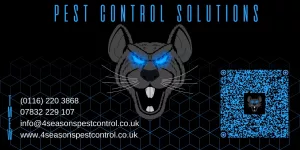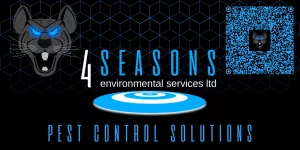Rodent Infestation Risks
Health Risks and Practical Tips to Minimise Infestations
by 4 Seasons Environmental Services
12 April 2024
Introduction
Rodents are unwelcome guests in any home or business, capable of causing significant damage and posing health risks to occupants. In this comprehensive guide, we’ll explore practical strategies to minimise the risk of a rodent infestation, along with the potential dangers of allowing these pests to proliferate.
Dangers of Rodent Infestations
Rodents, including mice and rats, are more than just a nuisance – they’re carriers of diseases and parasites that pose serious health risks to humans and pets. From salmonella and hantavirus to fleas and ticks, rodents can spread a variety of pathogens through their urine, droppings, and fur, contaminating food and surfaces in the process.
A rodent infestation can pose serious health risks due to the diseases and illnesses that rodents can carry and transmit to humans. Here’s a comprehensive list of sicknesses and illnesses that can arise from a rodent infestation:
Hantavirus Pulmonary Syndrome (HPS)
Hantavirus is a potentially deadly virus transmitted primarily by deer mice and other rodent species. HPS can cause flu-like symptoms initially, but it can progress to severe respiratory distress and organ failure.
Salmonellosis
Salmonellosis is a bacterial infection caused by Salmonella bacteria, which can be transmitted through contact with rodent faeces, urine, or contaminated food and water. Symptoms include diarrhoea, abdominal cramps, fever, and vomiting.
Leptospirosis
Leptospirosis is a bacterial infection caused by Leptospira bacteria, which can be found in rodent urine and contaminated water or soil. Symptoms can range from mild flu-like illness to severe complications affecting the kidneys, liver, and other organs.
Rat-Bite Fever
Rat-bite fever is a bacterial infection caused by Streptobacillus moniliformis or Spirillum minus bacteria, which can be transmitted through bites, scratches, or contact with rodent saliva or urine. Symptoms include fever, headache, muscle pain, and rash.
Plague
Plague is a bacterial infection caused by the Yersinia pestis bacterium, which can be transmitted to humans through flea bites from infected rodents or handling infected animals. Symptoms can include fever, swollen lymph nodes, and respiratory symptoms (pneumonic plague).
Tularemia
is a bacterial infection caused by the Francisella tularensis bacterium, which can be transmitted through contact with infected rodents, contaminated water, or insect bites. Symptoms can vary depending on the route of transmission but may include fever, skin ulcers, swollen lymph nodes, and respiratory symptoms.
Lymphocytic Choriomeningitis (LCM)
Lymphocytic choriomeningitis is a viral infection caused by the Lymphocytic choriomeningitis virus (LCMV), which can be transmitted through contact with rodent urine, droppings, or saliva. Symptoms may include fever, headache, nausea, muscle aches, and neurological symptoms.
Rabies
While rare, rodents such as rats and mice can potentially carry and transmit the rabies virus through bites or scratches. Rabies is a viral infection that affects the central nervous system and is almost always fatal if left untreated.
Eosinophilic Meningitis
Eosinophilic meningitis is an infection caused by certain types of roundworm parasites, such as Angiostrongylus cantonensis, which can be found in the faeces of infected rodents. Humans can become infected by ingesting contaminated food or water. Symptoms may include headache, neck stiffness, nausea, and neurological symptoms.
Asthma and Allergies
Rodent allergens, such as proteins found in their urine, droppings, and dander, can trigger asthma and allergic reactions in susceptible individuals, leading to symptoms such as wheezing, coughing, chest tightness, and skin rashes.
It’s essential to take prompt action to address rodent infestations to minimise the risk of exposure to these harmful pathogens and prevent associated health problems. Seeking professional pest control services and practicing proper sanitation and hygiene measures can help mitigate the health risks associated with rodent infestations.
In addition to health concerns, rodent infestations can also lead to property damage, as these pests are notorious for gnawing on wires, insulation, and structural materials, potentially causing fires, water leaks, and structural instability.
Identifying Signs of Rodent Activity
Before implementing preventive measures, it’s important to be able to recognise the signs of rodent activity. Common indicators include droppings, gnaw marks on food packaging and structural materials, grease marks along walls and baseboards, and the presence of nests or burrows in secluded areas such as attics, basements, and crawl spaces. Additionally, residents may hear scratching or scurrying noises coming from walls, ceilings, or attics, especially at night when rodents are most active.
Practical Tips for Minimising Rodent Infestation Risks
Seal Entry Points: Rodents can squeeze through surprisingly small openings, so it’s essential to seal any gaps or cracks in the building’s exterior, including around doors, windows, vents, and utility penetrations. Use durable materials such as steel wool, wire mesh, or caulk to block potential entry points and prevent rodents from gaining access to the premises.
Maintain Cleanliness: Rodents are attracted to areas with readily available food, water, and shelter, so keeping indoor and outdoor spaces clean and clutter-free can help deter infestations. Store food in airtight containers, promptly clean up spills and crumbs, and regularly empty garbage bins to eliminate potential food sources. Additionally, trim vegetation and remove debris from around the building to reduce harbourage areas for rodents.
Practice Proper Waste Management: Proper waste management is crucial for preventing rodent infestations, as rodents are attracted to garbage and organic waste. Use durable, lidded garbage bins with tight-fitting lids to prevent rodents from accessing the contents, and securely fasten compost bins to deter pests. Regularly empty and clean garbage bins, and maintain a clean and organised storage area for recycling and compost materials.
Install Rodent-Resistant Features: Consider installing rodent-resistant features such as door sweeps, chimney caps, and wire mesh screens to prevent rodents from entering the building through vulnerable entry points. Additionally, installing motion-activated lights or ultrasonic repellent devices can help deter rodents from approaching the premises.
Implement Integrated Pest Management (IPM) Strategies: Integrated Pest Management (IPM) is a holistic approach to pest control that emphasises prevention, monitoring, and targeted interventions to minimise the use of chemical pesticides. Work with a licensed pest control professional to develop an IPM plan tailored to the specific needs and challenges of your property, incorporating methods such as trapping, baiting, and exclusion to effectively manage rodent populations while minimising environmental impact.
Conclusion
Rodent infestations pose significant risks to health, safety, and property, making prevention a top priority for homeowners and businesses alike. By understanding the dangers of rodent infestations and implementing practical preventive measures, individuals can minimise the risk of infestation and protect their homes and businesses from the harmful effects of these pervasive pests. From sealing entry points and maintaining cleanliness to practicing proper waste management and implementing integrated pest management strategies, there are many steps individuals can take to keep rodents at bay and ensure a pest-free environment for themselves and their loved ones.

© Copyright 2024 by 4 Seasons Environmental Services. All Rights Reserved.









